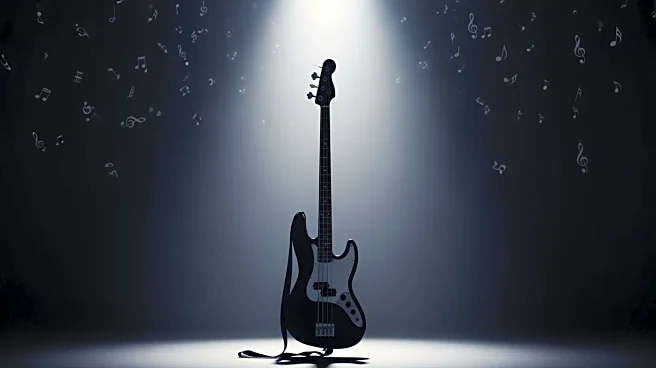What's Happening?
Sam Rivers, the founding bassist of the band Limp Bizkit, has died at the age of 48. The band announced his passing on Saturday through an Instagram post, expressing their deep sorrow and describing Rivers as 'pure magic' and 'the pulse beneath every
song.' The post did not specify the cause of death. Rivers was instrumental in defining Limp Bizkit's sound during their peak in the late 1990s and early 2000s, contributing not only as a bassist but also providing backup vocals. The band, known for hits like 'Break Stuff,' 'Nookie,' and 'My Way,' rose to fame with their unique blend of rock and hip-hop. The tribute was signed by lead singer Fred Durst and other band members, who praised Rivers for his talent, presence, and enormous heart.
Why It's Important?
Sam Rivers' death marks a significant loss in the music industry, particularly for fans of Limp Bizkit and the nu-metal genre. Rivers was a key figure in the band's success, helping to shape a sound that resonated with a generation. His contributions to music extended beyond performance, as he was involved in charity work and had a positive impact on many lives. The band's heartfelt tribute highlights the personal and professional void left by his passing. For the music community, Rivers' death is a reminder of the fleeting nature of life and the enduring impact of artistic contributions.
What's Next?
In the wake of Rivers' passing, fans and fellow musicians are likely to pay tribute to his legacy through social media and music platforms. The band has requested privacy for Rivers' family, but they have encouraged fans to honor his memory by playing his music. This could lead to a resurgence in the popularity of Limp Bizkit's music as fans revisit their catalog. Additionally, the band may organize a tribute event or release a commemorative project to celebrate Rivers' life and contributions.
Beyond the Headlines
Rivers' death may prompt discussions about the pressures and challenges faced by musicians in the industry. It also highlights the importance of mental health and support systems for artists. The music community may use this moment to advocate for better resources and support for musicians dealing with personal and professional struggles.














